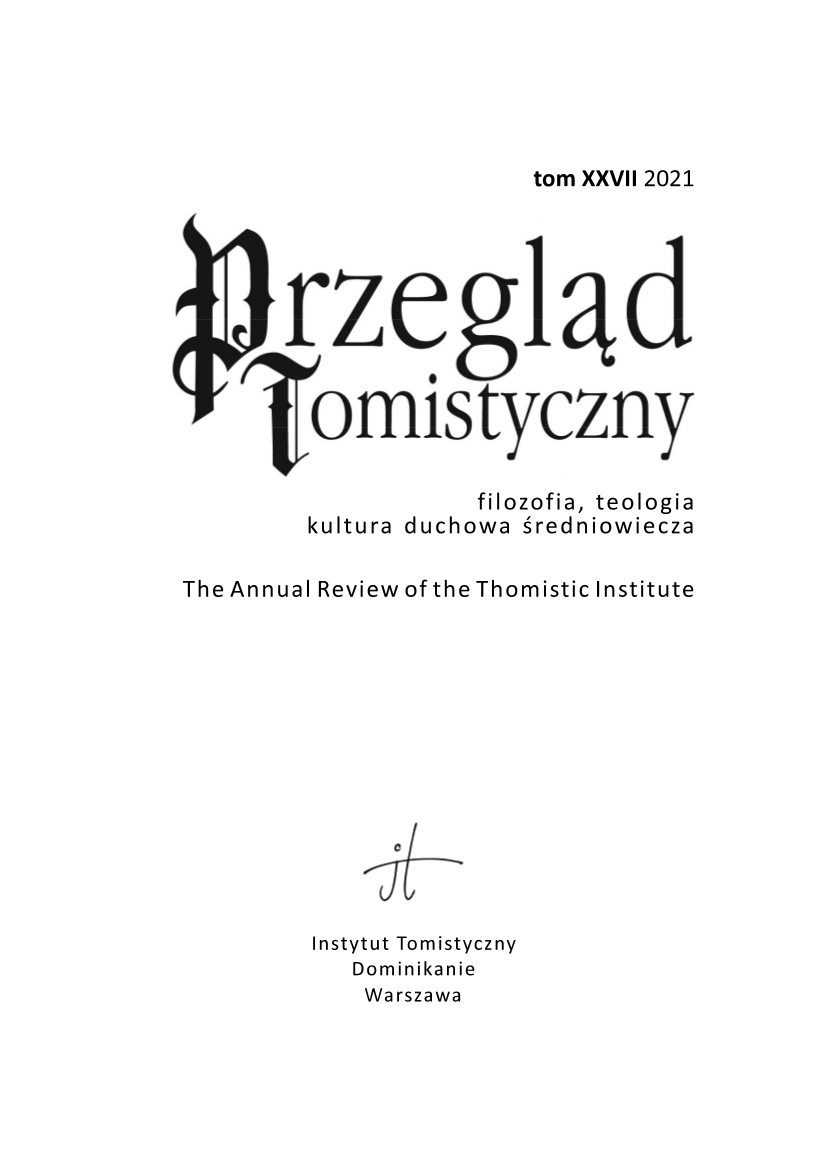Godność osoby ludzkiej w ujęciu św. Tomasza z Akwinu
The Dignity of the Human Person According to St. Thomas Aquinas
Author(s): Robert PlichSubject(s): Christian Theology and Religion, Philosophy of Middle Ages
Published by: Instytut Tomistyczny
Keywords: Thomas Aquinas; dignity; person; mode of existence; nature; teleology; rationality; freedom; goodness; morality; image of God; law; justice; capital punishment; common good;consequentialism;
Summary/Abstract: Saint Thomas Aquinas did not produce a separate, systematic consideration of the concept of human dignity. Instead, he dealt with the phenomenon of dignity while discussing other issues. This article attempts to reconstruct the concept of dignity on the basis of those passages in the works of St. Thomas that are most representative of his understanding of this idea. Among the various meanings that St. Thomas ascribes to the term in his works, the most fundamental and general is the understanding of dignity as ‘goodness in itself ’, as opposed to ‘utility’, which is goodness for the sake of something else. Relating this understanding of dignity to the human person, we can distinguish two varieties of dignity that are crucial to anthropological and moral reflection. The first variety is dignity understood as the subsistence in rational nature that makes a rational creature exist in itself and for its own sake and therefore constitute an end in itself. This variety of dignity is referred to in our times as the inherent dignity of every human person. The second is dignity understood as the goodness of a person’s moral character, which consists in living in conformity with reason, that is, with the rational order of the teleology of human nature. These two meanings and aspects of dignity are not explicitly or radically distinguished by Thomas and this is an indication of their interrelatedness. The reason for this interrelatedness may be the teleological dynamism of a rational nature, which underlies both of these aspects of dignity. In fact, dignity itself is characterized by teleological dynamism. This, in turn, makes it possible for dignity thus understood to be enlarged or diminished. Morally evil behavior is contrary to the realization of the telos or end of human nature and thus to the teleological character of the dignity of the person who acts wickedly. Depending on the degree of the moral evil of his actions, a human being brings himself to various levels of loss of his dignity. It is possible to lose a critical degree of dignity as a result of shameful conduct, which constitutes a departure from the order of reason and leads to a kind of brutalization of the human being. Human persons should never be treated merely as means to anyone’s ends because of their dignity. Yet the more a person loses his dignity, the more he himself ceases to be protected by it from utilitarian treatment. For this reason, a just punishment does not violate the dignity of a human being. That is because such a punishment is fitting for an act by which the perpetrator has divested himself of a critical scope of his own dignity. It is within this framework, pointing out the loss of dignity, that Aquinas explains the moral permissibility of the death penalty. The death penalty may seem to present some challenges to the coherence of his conception of dignity, but this article attempts to interpret Thomas’ position in such a way as to demonstrate its internal coherence and thereby reveal the understanding of dignity that emerges in its light. The model of dignity presented by St. Thomas can also be expressed as a person’s capacity to live in accord with reason, that is, his capacity for morality and the actualization of that capacity. Dignity in this sense is a determinant of the privileged position that is occupied by human beings in the hierarchy of all the beings in the universe. The cause of a human being’s existence, and thus the source of his dignity, is the fact that he is created in the image and likeness of God. Therefore, the different manifestations of God’s image in human beings, and the stages of its further realization or obliteration — which Thomas distinguishes and interrelates — are at the same time different stages in the development or loss of human dignity.
Journal: Przegląd Tomistyczny
- Issue Year: 2021
- Issue No: XXVII
- Page Range: 205-270
- Page Count: 66
- Language: Polish

